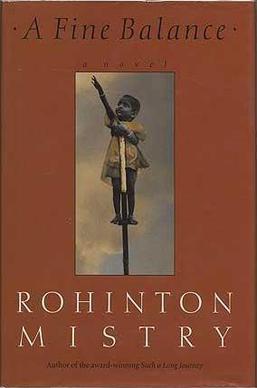
With A Perfect Balance I continue my exploration into Indian literature. Maybe I am fascinated by the culture or I have been getting lucky with surprisingly great writers. This book is also a part of Oprah’s book club. Now I am not a fan of Oprah’s show, but I can appreciate the things she does and I would love to be able to say that most rich people act like she does. Anyway what I am getting at is her book club has yet to let me down.
Onto the review. The reader starts out the book meeting the four main characters. Aunty Dina, Maneck, Ishvar and Omprakesh. The setting is a flat in a huge city, that is never named, in India. Dina rents the flat and because of certain laws is allowed to stay there without rent increase as long as she can afford it. The problem is since the death of her husband and her increasing age she is unable to afford the current rent. This coupled with the fact that the landlord does what he can to make her move makes things difficult. In order to pay the bills she hires two tailors, Ishvar and Omprakesh. These two make clothes that she sells to a big company. Maneck is the son of Dina’s childhood friend. Maneck is going to school and is a paying guest.
The book then jumps back in time. It follows the early lives of all the main characters until they get to the point at the beginning of the book. From there it continues with this unlikely groups lives and eventual friendship. The book is labeled as fiction, but you know that it is all based on real situations. Dina chooses to get married to a man without the approval of her family. She lives with the constant judgment of her surviving brother. Ishvar and Om leave the countryside because there is no work. The hope is living in the city will bring good fortune. After months of living on the street and in a shack on the side of a railroad track, they finally get to work for Dina. Maneck goes to college to learn refrigeration. He develops friendships that are torn apart by politics.
The book uses the characters to tell the story of India in the late 1970’s. The political upheaval of the time makes crime and extortion the best way to survive. Children are mutilated on the streets so the can gain more money begging. The police will roll into town and sweep everyone off to a work camp to make money for road builders and the politicians and police they pay off. Hundreds of other atrocities are made to “better” the country.
The book is also about friendship. How, even through these hardships, these four unlikely people become a family. The struggle of Dina to care for those that “are below her.” The hotheaded Om accepting someone in a place of power as a friend. The way all the characters grow as people interweaves throughout the book.
The writing is simple, but engaging. You become invested in their lives and feel for their hardships and rejoice at their successes. I think any reader would be drawn into their world and come out better on the other side.
5 Intellectual/ Emotional: The combination of learning about the lifestyle of the people of India combined with the emotional impact the characters provide makes this worth 5.
3 Readability/Style: Mistry’s style is simple and easy to read. Occasionally you are graced with a line that sticks with you, but for the most part it is very bare bones.
3 Long Term Impact: Unfortunately, I feel this book will get lost in amongst the many other great artists writing in India. He is young though and hopefully he will produce mre great work that will bring this to a more popular stage.
11/13 – A great little book. Anyone interested in literature would find this worth the read.
Keep Turning Pages
No comments:
Post a Comment